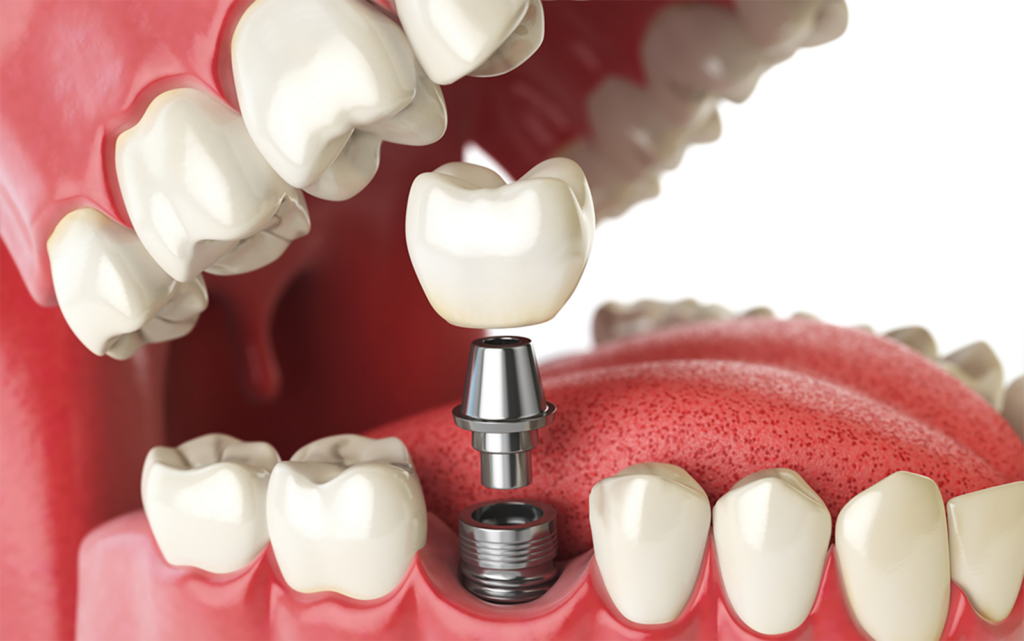If you’ve been discussing the possibility of getting dental implants with your dentist, you may have quite a few questions running through your head such as: is it worth it to get dental implants?
While it may come at a higher cost than other procedures, dental implants may be the exact solution you’ve been searching for to improve both your dental health and overall wellbeing. First, let’s talk about what dental implants are in the first place so you have a better understanding of the implant surgery procedure.
What Are Dental Implants?
A dental implant is essentially acting as a new root for your missing tooth (or multiple missing teeth). It’s a metal post (titanium screw) that will be surgically attached to your jawbone after a small slit is made in your gums. From there, an abutment will be attached on top of the screw for a dental crown to be held permanently in place that looks and feels exactly like your natural teeth. However, before receiving a dental crown, your bone must heal first and accept the new “root.” Healing obviously varies per patient, but it could take anywhere from six months or more to fully heal, although you may receive your dental crown after about two or three weeks. All the healing is done “behind the scenes,” meaning you won’t even feel it after a certain period of time and many patients don’t even report feeling much pain throughout the entire process. It just requires a lot of patience as you take the time to get back into your normal eating habits, especially when it comes to harder, chewier foods.
Dental implant surgery is simple for the most part. But if you’ve been suffering from a condition like gum disease, healing may take longer as you undergo a bone graft or gum graft procedure.
What Is A Bone Graft?
A bone graft is required when your jawbone isn’t sufficient enough to hold the dental implant in place. Why does this happen, you may wonder? Well, the longer you go with just a single missing tooth, the more likely you are to experience bone loss and without a strong jawbone, your dental implant surgery won’t succeed. A graft can come from a few different places such as another part of your body (like a knee or hip) or a donor. Now your jaw can become thicker and stronger to support your new tooth. However, it may take six months before you’re ready for a dental implant. Regular x-rays will need to be taken in order to ensure your jawbone is accepting the graft.
Sometimes patients may need a gum graft too. Gum grafts are when your periodontist removes tissue from either the roof of your mouth, or a donor’s, to surgically attach it to your gums that are thinning and need help supporting a new tooth. If you have receding gums due to gum disease, your dental implants will not be able to succeed and it may cause functional problems.
The Advantages of Dental Implants
There are many advantages to dental implants that your dentist will discuss with you, including:
Improved Appearance and Self Esteem
Whether you have one or more missing teeth, it can be a hindrance, leave you feeling embarrassed and like you have to hide your smile. But with implants, you can be brought peace of mind knowing this permanent solution will make your smile as happy and healthy as ever and no one will ever notice a difference. Dental crowns look and feel completely natural as they’re typically made from porcelain – one of the most durable and natural-looking materials used in modern dentistry.
Improved Bite and Chew
When you have missing teeth, it can cause a lot of problems with digestion. With dental implants, you can slowly start getting back to your regular diet again as your bite force will be completely restored. If you’ve tried dentures before and they didn’t quite work because they slipped around while you ate, this permanent and durable solution may be just the thing you’ve been searching for, so make sure to ask your dentist about implant-supported dentures.
Improved Speech
Another issue patients find with dentures is that their speech is impaired. Having missing teeth can also cause you to pronounce words differently, but implants can solve this issue. Dental implants are meant to act just as natural teeth, therefore, there would be no difference in the way you speak or eat. You also don’t have to worry about them slipping around as you laugh, cough or sneeze.
Prevents Bone Loss
As mentioned above, having a missing tooth (or more) can drastically affect the health of your jaw and underlying bone. Your jaw is relying on your healthy, strong teeth in order for it to do as it’s supposed to. Without teeth, your bone can start shrinking and cause other medical and oral health complications. It can also increase your risk of being diagnosed with gum disease. Having a dental implant act as your new tooth will ensure your jaw remains as strong as possible.
Prevents Teeth From Shifting
If you have gaps in your mouth, you’re at risk of shifting. Even if just a single tooth shifts, it can cause a lot more oral problems than you planned for and put you more at risk of experiencing decay and gum disease. It’s also bad news for your wallet, as you have to pay for more procedures to correct the shifting. With implants and dental crowns, you don’t have to worry about gaps nor the issues that arise from shifting.
Prevents Facial Changes
Not only are gaps a huge invitation to shifting, but they can also cause changes in your facial structure. When you have gaps, there is nothing left to support your cheeks and lips, therefore, facial caving can occur. This is also common for patients who have worn dentures for a long period of time. Dental implants help to support your face and prevent changes from occurring in the first place.
How Long Do Dental Implants Last?
Dental implants can actually last a lifetime and have a success rate of 98%. One thing you may need to have replaced after 15 years or more is your dental crown, but if you follow a strict and healthy oral hygiene regime, they may last upwards of 20 years.
Are Implants Easy To Care For?
Implants may sound complicated, but they’re really not! Implants do not require you to purchase special products to look after them. All you have to do is stick to your regular oral hygiene routine by brushing twice a day followed by flossing and rinsing with mouthwash once a day.
So … Are Implants Worth It?
If you were wondering if implants are worth it, we hope this clears any confusion you may have had. The reason your dentist discussed the possibility of implants with you in the first place was to improve your health. Not only are they a great way to improve the appearance of your smile, but they can efficiently improve the strength of your jaw, improve any digestion or speech problems you were experiencing beforehand, prevent shifting and facial structure changes and more! If you’re ever worried about the cost, speak to your dentist about flexible payment plans so you can still receive top-quality treatment to improve your health. You deserve it.


